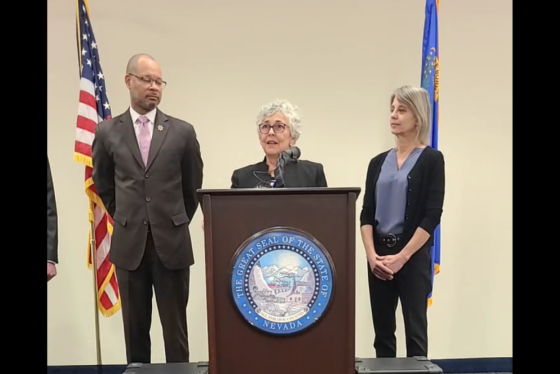Today, the Nevada Credit Union League announced a partnership with the Nevada Attorney General’s Office and Nevada Bankers Association to combat and prevent imposter banking scams by raising consumer awareness on how Nevadans can protect themselves.
Attorney General Aaron Ford and Nevada Credit Union League President and CEO Diana Dykstra agreed that the best way to combat banking scams and the criminals perpetrating them is through consumer awareness. These predators will prey on people from all walks of life to scam their deposit accounts, credit cards, debit cards, and other accounts, which is why it is imperative the citizens of the Silver State stay diligent.
“Silver State residents are Nevada’s frontline defense against cyber thieves, hackers and fraudsters,” Dykstra said. “It is imperative that everyone remain vigilant and keep a diligent eye open for fraud attempts. If you think you see something that is fraud, please report it to the authorities and to your credit union or other financial institution.”
Dykstra and Ford said cyber criminals are becoming increasingly creative with how they try to hack into consumer accounts and steal money. Recently, criminals have turned to “smishing” tactics, which is a phishing attempt through a text message (SMS). These criminals will fraudulently represent themselves as a credit union or bank while texting a consumer, asking for important and personal information.
However, a “smishing” text-message is something a credit union or another reputable financial institution would not do. This is just one type of fraud attempt that is becoming more prevalent.
“These scams all have one thing in common: an attempt to create a sense of urgency. They are very sophisticated and are designed to trick even the savviest of consumers,” Ford said. “These scammers know what they are doing. Please protect all of your accounts with multi-factor authentication. And do not provide multi-factor authentication codes or passwords to anyone over the phone. This will help protect your account in the event your information is compromised.”
If Nevadans even remotely think a website link is a fraudulent attempt to pry into their personal information or financial lives, they should not click on it or use it in any other communication, email, or any fashion. They should contact their credit union or other financial institution immediately. Consumers can use these tips and tricks posted by the Federal Trade Commission (FTC) to help identify fraud and prevent the hacking of anyone’s account.
“I’m proud to partner with the Nevada Credit Union League and the Nevada Bankers Association to bring an end to these types of scams,” Ford said. “Together, we will work with consumers to cut these scammers off at the pass.”
As not-for-profit member-owned cooperatives, credit unions thrive when their members achieve financial success, which is why preventing fraud is so important, Dykstra said. “The League and local credit unions would like to thank the Nevada Attorney General for leading the effort on this crucial awareness campaign,” she added. “Once again, we implore the people of Nevada to keep a watchful eye out for these cyber criminals.”
You can view Ford’s press conference here.
The FTC’s Bureau of Consumer Protection offers the following consumer tips:
- If you get a text message from a company that asks you to click on a link, pause and ask yourself if it is a company with which you have done business. If the answer is no, it is likely a scam. If the answer is yes, contact the company by using the number of your bank that is on your credit or debit card to confirm any suspicious transactions.
- Protect all of your accounts with multifactor authentication (MFA). This means that you will need extra credentials to log into your accounts, such as a code sent to your mobile device. Do not provide MFA codes or passwords to anyone over the phone. This will help protect your accounts in the event your information is compromised.
- Financial institutions will not ask customers to transfer funds between accounts in order to help prevent fraud.
- In addition to knowing the victim’s financial institution, cybercriminals often have additional information such as the victim's past addresses, partial Social Security numbers, and the last four digits of their bank accounts to convince the victim of their authenticity. It is best to hang up and call the number on the back of your card.
- After sending a fake alert that money was fraudulently transferred, cybercriminals will call from a number which appears to match the financial institution's legitimate 1-800 support number. Under the pretext of reversing the fake money transfer, victims are swindled into sending payment to bank accounts under the control of the cyber actors.
- If you think you’ve been a victim of a scam, always report it. Even if you can’t get your money back, you can prevent the scammer from taking money from someone else.
- Your financial institution will not carry on a conversation with you over text message. If you are suspicious of the veracity of the sender, stay safe and don’t respond.
- For additional information about protecting yourself from depository imposter scams, see https://www.banksneveraskthat.
com/about/.

(Left to right) Aaron Ford, Attorney General for the State of Nevada; Diana Dykstra, President and CEO of the Nevada Credit Union League; and Phyllis Gurgevich, President and CEO of the Nevada Bankers Association.